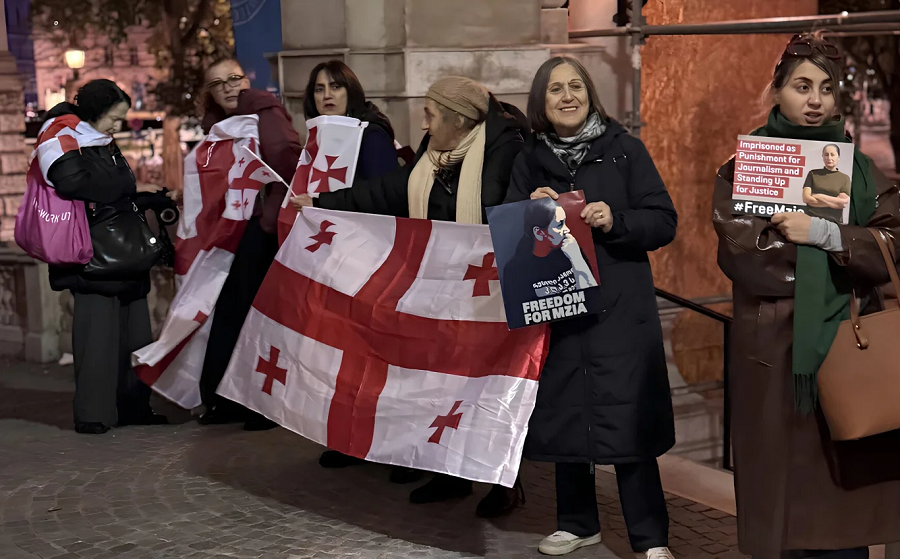EU NEIGHBOURS east. “It’s strange being on stage in Europe, accepting an award for a colleague you knew, a prominent journalist who is not with us any more,” said Ukrainian journalist Anna Babinets, as she stood at the University of Vienna to accept the International Press Institute’s Press Freedom Hero award, held as part of IPI’s 75th anniversary World Congress.
The colleague she spoke of was Victoria Roshchyna, 26, a freelance reporter who went alone into Russian-occupied territories to document the invasion. Roshchyna’s body was repatriated to Ukraine and buried in Kyiv almost one year after the official date of her death in a Russian prison.
“Can you imagine,” Babinets asked the audience, “that a professional journalist from a European country, in the 21st century, is dying in prison because of torture and starvation?”
‘Every Ukrainian newsroom is also an archive now’
Read also
Ukraine has become the world’s harshest laboratory for journalism. When Russian missiles strike, editors file stories between air-raid alerts; when the power goes out, reporters write from bunkers lit by generators.
Anna Babinets is the co-founder and editor-in-chief of Slidstvo.Info, an investigative agency based in Kyiv. Within days of the invasion, Babinets’ newsroom released its first open-source investigation – identifying a dead Russian pilot from the number on his helmet. “We turned ourselves into war reporters overnight,” she said.
In Kyiv, the executive Director at Ukrainska Pravda, Andriy Babarykin, still counts each strike that lands close to their office. “A few months ago a missile shattered our windows again,” he said. “We fixed them and kept working. Because if we stop, someone else will fill the silence with lies. Every Ukrainian newsroom is also an archive now. We document war, and we live it.”
Even amid exhaustion, ethics remain. “When we expose corruption during war, it feels like cutting into our own skin,” Babinets admits. “But we must. Otherwise, what are we fighting for?”
Georgia: when simply doing your job is dangerous
In Georgia, reporters covering peaceful protests in Tbilisi have increasingly become targets of police aggression and arbitrary detention. According to local watchdogs, more than 50 journalists have been assaulted while documenting demonstrations over the past year. Several were charged with ‘public order’ violations simply for filming the events.
Independent newsrooms are under growing financial and political pressure. Critical outlets report frozen bank accounts, blocked advertising contracts, and sudden tax inspections that disrupt daily operations.
Natalia Antelava, a prominent Georgian journalist and founder of Coda Story, notes that repression now extends far beyond the media: “It’s not just journalists. It’s anyone – museum directors, musicians, even symphony conductors. But journalists are on the very front line.”
Among them is Mzia Amaglobeli, Georgia’s leading independent voice and founder of media outlets Batumelebi and Netgazeti, now imprisoned. Accepting the Press Freedom Hero award on her behalf, her colleague Tamar Rukhadze, deputy director of Batumelebi, described the growing repression:
“In the past few days, over 80 people have been arrested in my country. And the number of detained journalists keeps increasing. And I fear how these numbers may have changed by the time this remarkable award reaches Georgia.”
Amaglobeli’s defiance – her 38-day hunger strike, her refusal to take the accused’s seat during trial – has turned her into a symbol of integrity for the entire Georgian media community.
Armenia: the women who tell the war
Despite progress in the 2025 World Press Freedom Index, Armenia’s media environment remains fragile. Journalists continue to face political pressure and public attacks. Covering security issues and the war over Nagorno-Karabakh has placed additional strain on local media, exposing the deep ethical and emotional dilemmas of reporting.
Roubina Margossian, managing editor of EVN Report, an independent online weekly magazine, says Armenian journalism is also a story of women’s resilience and reinvention. “For women to be seen as the keepers of memory and the ones that pass it on, they first need to be given a front-line seat. For this to happen, we need to be involved very heavily, and in the case of the war that I covered, what we don’t know about war – or what we don’t speak about enough – is that war changes. Every single war, from week to week, changes.”
Founded in 2017, EVN Report was created to bridge a gap between Armenia and the world – “because the Armenian media was speaking about Armenians, for Armenians, among Armenians,” Margossian recalls. Run entirely by women, the outlet grew through times of revolution and war, becoming bilingual and multimedia as the country’s crises deepened. “We developed very fast in a multifaceted way,” she says. “I attribute a lot of that to us being women – being flexible, taking freedoms in format, in thinking, in representation – freedoms that other media organisations probably wouldn’t have taken.”
Moldova: disinformation and Russian tactics
Moldova’s recent parliamentary elections exposed how disinformation has become a political weapon – yet, despite coordinated attacks, pro-democratic forces ultimately prevailed. Russian-linked digital networks targeted voters with waves of manipulative content aimed at undermining pro-European sentiment and destabilising democratic institutions. Investigative journalists describe an increasingly hostile online environment where paid trolls, fake ‘media trainings’ and coordinated smear campaigns worked hand in hand to erode trust in the press.
“Those digital armies were created for the elections in Moldova,” says Alina Radu, award-winning investigative journalist and editor of Ziarul de Gardă (ZdG), the country’s leading investigative outlet. “Invitations to join a free training came to everyone in the digital space – Facebook, TikTok. It started off about posting things about our lives… then suddenly it was about prices, politics, gas, and finally ‘we don’t like this president’. These are sophisticated influence operations designed to spread resentment and anti-Western narratives. Putin’s goal is to destroy democracy. He will come wherever there are elections and where life is better than in Russia. Just be prepared.”
Independent journalists who expose corruption or Russian propaganda face digital harassment campaigns almost immediately after publishing. As Radu puts it, “We know who is responsible, and we know who pays. The next step is just to hold those responsible to account.”
Azerbaijan: the digital grip on free media
Azerbaijan has one of the highest numbers of imprisoned journalists, with organisations like Reporters sans frontières reporting at least 25 in mid-2025. International bodies including the European Parliament, the European Union, and Amnesty International have condemned these actions and called for the release of all imprisoned journalists.
The wave of arrests began in late 2023 with the detention of the Abzas Media team. “Since that moment, the crackdown hasn’t stopped,” says Leyla Mustafayeva, Editor-in-Chief of Qazetci, an exile-based Azerbaijani outlet focused on fact-checking and investigative reporting. “There is no independent journalist who would dare to collaborate with us from inside the country.”
Her team has developed strict digital security protocols after a wave of sophisticated phishing attacks – emails and WhatsApp messages that appeared to come from well-known NGOs offering ‘IT support’. “They used real names and positions of people from international organisations,” Mustafayeva recalls. “Everything looked real – but it was fake. One of the journalists who received such an email is now in jail.”
Beyond arrests, Azerbaijani authorities have built an ecosystem of digital surveillance targeting both domestic and exiled critics. Mustafayeva describes a government database that monitors roughly 20,000 Azerbaijanis – journalists, activists, politicians – automatically recording their online comments and social media activity. “If the government wants to target someone,” she says, “they can open the file and see every post you’ve made – critical or not.”
This system builds on earlier revelations from the Pegasus Project, which in 2019 exposed over 1,000 Azerbaijani phone numbers on the spyware list, including hundreds of journalists and human rights defenders. “Even from exile, we feel it. My husband’s Twitter account was blocked in Azerbaijan, and he’s received multiple threats. The more you speak out, the greater the danger becomes,” Mustafayeva adds.
Belarus: how to report freely, despite everything
Once one of the most influential media in Belarus, TUT.BY was shut down by the authorities in 2021 after two decades of operation. Dozens of its journalists and staff were detained under fabricated ‘economic’ charges. But the team rebuilt itself abroad as Zerkalo.io – ‘Mirror’ in Russian.
“Our website was blocked the very first day we launched,” recalls Ilona Elyashevich, manager at Zerkalo. “And it was blocked in Russia the day after the full-scale invasion of Ukraine began.”
Declared an “extremist formation” by the Belarusian regime, Zerkalo’s readers now risk up to seven years in prison simply for liking or sharing its posts. To protect their audience, the newsroom shifted from a website-based outlet to a multi-platform presence across YouTube, Instagram, and TikTok – platforms where algorithms, not subscriptions, bring the stories to users.
Despite exile, the team faces constant digital warfare: monthly cyberattacks, phishing attempts, and coordinated propaganda to expose their journalists. Most reporters remain anonymous to safeguard relatives still inside Belarus.
Financial survival is another daily battle. Now that the media’s audience is scattered across Europe and the advertising market has been destroyed, revenue from commercial sources comes in only partially.
The way forward
Austrian Foreign Minister Beate Meinl-Reisinger put it simply: “Freedom of speech is not something we can take for granted. We must protect and strengthen it every day, in every country, and at every level.”
From another angle, Andrea Cairola, Advisor for Communication and Information at the Section for Freedom of Expression and Safety of Journalists at UNESCO, described press freedom not only as a right, but as infrastructure for progress.
“Access to information is not just a democratic value – it’s part of sustainable development,” he said. “The media sector is both a watchdog and an enabler.”
At a UNESCO panel in Vienna, Cairola outlined the connection between media freedom and the UN’s 2030 Agenda. Journalism, he argued, sustains accountability in politics and the economy alike, uncovering wrongdoing but also enabling societies to function transparently.
Across the Eastern Partnership, editors and experts point to the same priorities for survival and renewal.
First, protect journalists – both physically and digitally. From bulletproof vests in Kyiv to encryption networks in Baku, safety training and legal aid must be systematic, not improvised after each attack.
Second, reinvent business models. Independent media cannot rely on grants alone. Blended revenue – subscriptions, memberships, events – creates both resilience and autonomy.
Third, build cross-border cooperation. Shared investigations and multilingual publishing expand reach and provide a layer of collective security.
Fourth, counter disinformation. Fact-checking hubs, algorithmic transparency, and public-education initiatives are essential antidotes to manipulation.
Fifth, strengthen legal frameworks. Aligning with standards like the European Media Freedom Act can anchor media independence in law, not only in principle.
As Joseph Stiglitz, Nobel laureate in economics, reminded the audience, censorship today is not limited to police raids or arrests. It can be quiet, bureaucratic, and economically engineered – “a way to instill fear so that people don’t speak up, don’t write.”
And yet, as the region’s journalists have shown – from Kyiv to Tbilisi, from Yerevan to Chişinău – the instinct to report, to document, to keep telling the story endures.
Author: Olga Konsevych
Article published in Ukrainian by TSN.ua
























































